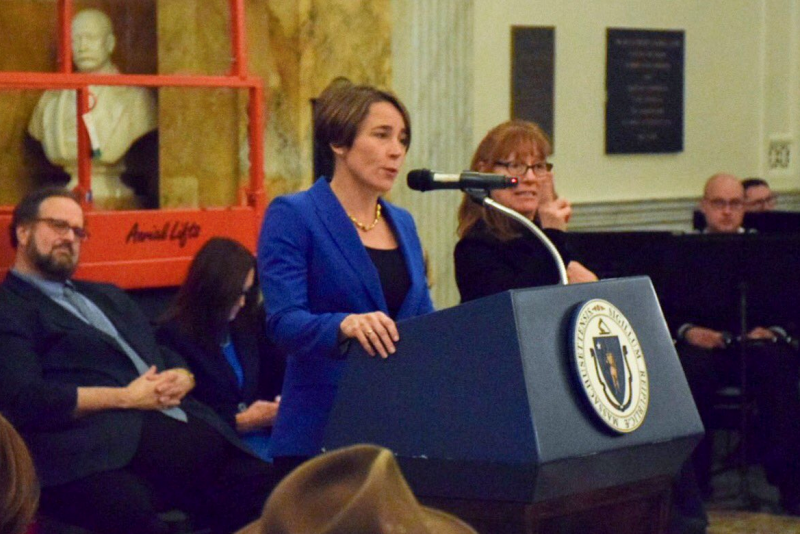Community
AG Healey issues advisory to make access to food pantries easier for immigrants and homeless during pandemic

BOSTON – As the COVID-19 public health crisis continues to cause financial hardship for residents across the state and food insecurity is on the rise, Attorney General Maura Healey has issued an advisory to assist food pantries to ensure those seeking assistance do not face barriers to accessing food.
The pandemic has led to a near 60 percent increase in food insecurity in the state, the largest relative increase in the nation, and the percentage of children who don’t have enough to eat has more than doubled. The advisory from the AG’s Office, drafted in collaboration with The Greater Boston Food Bank, Massachusetts Law Reform Institute, and Central West Justice Center, aims to help food pantries adopt best practices to reduce barriers to access to food assistance for vulnerable residents. Specifically, the AG’s Office advises that food pantries should not require photo identification or Social Security cards; should carefully consider their policies for collecting information about those seeking assistance; and should share information about other resources available to address food insecurity.
“Food insecurity has emerged as one of the most pressing issues facing our state, and we need to do everything we can to prevent more families from going hungry,” said AG Healey. “My office is committed to supporting agencies and organizations that are addressing this need. Food insecurity is everyone’s issue in this Commonwealth and now is the time where we all have to pitch in.”
“The Greater Boston Food Bank’s mission is to end hunger and work with our nearly 600 pantries, meal programs and mobile markets, to make food accessible to anyone in need in Eastern MA,” said Catherine D’Amato, president and CEO of The Greater Boston Food Bank. “That includes providing guidance and best practices to remove barriers and reduce stigma and fear for our clients. We appreciate the thoughtful approach in partnering with the AGO, DESE and MDAR, and our sister food banks, in issuing guidance to the emergency food network. We look forward to continuing the collective action to encourage a safe and welcoming environment for individuals and families to seek food assistance without hesitation.”
“We are pleased to have joined forces with Massachusetts Attorney General Maura Healey to draft this timely guidance,” said Patricia Baker, Senior Policy Analyst at the Massachusetts Law Reform Institute. “We know that food pantries are doing their best to feed as many as residents of the Commonwealth as possible. Ensuring that vulnerable families and individuals with few resources are not required to clear unnecessary hurdles is a critical step to addressing the food insecurity crisis exacerbated by the pandemic.”
“With hunger on the rise in the Commonwealth, we at CWJC are happy to work with the office of the Attorney General in ensuring that our immigrant neighbors can access food resources without barriers,” said Gina Plata-Nino, staff attorney at Central West Justice Center.
“The COVID-19 pandemic and subsequent economic fallout has exacerbated food insecurity in communities, particularly those with people of color and with lower incomes. The Commonwealth’s COVID-19 Command Center Food Security Task Force was established to immediately address food assistance needs, and to strengthen our food system and increase access, and leveraging existing nutrition resources,” said Health and Human Services Secretary and COVID-19 Command Center Director Marylou Sudders. “We appreciate the support of the Attorney General’s office to enforce laws to maintain the critical food access lifeline that food pantries provide, especially in this time of increased need.”
“The Baker-Polito Administration has made addressing food insecurity a critical priority in its response to the ongoing COVID-19 pandemic and its impacts on families across the Commonwealth, including direct support to food banks and food pantries through the Massachusetts Emergency Food Assistance Program (MEFAP), increasing the program’s annual funding allocation by $9 million over the past year,” said MDAR Commissioner John Lebeaux. “The Administration welcomes Attorney General Healy’s clarifying advisory, which will support the excellent work taking place at hundreds of food pantries throughout Massachusetts and increase access to food for our most vulnerable residents.”
“The Food Bank of Western Massachusetts believes that everyone has a right to healthy food regardless of their circumstances,” said Christina Maxwell, Director of Programs, The Food Bank of Western Massachusetts. “We envision a day when no one goes hungry and everyone has access to nutritious food. The emergency food network in western Massachusetts and across the Commonwealth welcomes anyone and everyone who is in need of food assistance. We realize that it can often be difficult to ask for help, so it is crucial that we limit the barriers that are placed between people and the healthy food they need to live a full and active life.”
“Nutritious food is a basic human right and fundamental to health and so much more,” said Jean McMurray, CEO of the Worcester County Food Bank. “Worcester County Food Bank and its network of food pantries welcome and help any individual and family in need with food and information on other resources. Together with hunger-relief partners across the state, we are working to ensure that no one goes hungry in the Commonwealth.”
“We at the Merrimack Valley Food Bank and our counterpart food banks realize that our member pantries and food providers on the front lines experience significant challenges, so you can ensure that all of your guests receive the lifesaving food and other services they need,” said Amy L. Pesia, Executive Director of the Merrimack Valley Food Bank. “We appreciate the Attorney General’s help in removing the barriers that exist, whenever possible, including requirements for guests to provide documents to receive food. Requiring documents could provide a barrier for these vulnerable neighbors, as well as those are new to the emergency food system, as they’ve never needed to ask for help before now. They need food and need our help.”
“Families who are most in need should not have to confront unnecessary requirements in order to receive assistance from food pantries,” said Isabel Lopez, Founder and Director of the Brockton Workers’ Alliance. “We reported this issue to the AG’s Office because we saw the significant impact these policies were having on lower income people of color in our community. Through the recommendations in this guidance, food pantries can help to address the systemic racism that their clients too often face.”
“We are ground zero for the pandemic in Chelsea, and the need for food assistance for our community has rapidly grown since March,” said Gladys Vega, Executive Director of La Colaborativa. “The lines for food and other needed items stretch down multiple city blocks. In these times, we all need to work together and this guidance from the AG’s Office will help ensure our residents don’t face unnecessary obstacles when seeking the food they need to survive.”
To reduce barriers, food pantries should not require photo identification or Social Security cards from clients seeking food, according to Healey.
“Many vulnerable residents may not have a photo ID or Social Security card. For example, immigrants often lack state IDs, driver’s licenses, or Social Security numbers. They may also fear providing these documents because of their immigration status. Homeless residents also face difficulty in obtaining these documents.”
Food pantries that distribute food through the Emergency Food Assistance Program (TEFAP) and the Massachusetts Emergency Food Assistance Program (MEFAP) are prohibited from asking clients to produce photo identification and Social Security cards in order to receive food from these public programs, according to a July letter from the state Department of Elementary and Secondary Education and the state Department of Agricultural Resources.
The AG’s advisory also notes that requiring pantry clients to provide photo identification and Social Security cards also may violate Massachusetts anti-discrimination law, as the requirement may have a disproportionate impact based on national origin or race.
According to the advisory, organizations that collect sensitive information from individuals including their names, along with their Social Security numbers, state ID numbers or driver’s license numbers are required to adopt security safeguards to prevent identity theft.
-

 Community6 years ago
Community6 years agoNational Shrine of La Salette Festival of Lights 2017 set to begin
-

 Community6 years ago
Community6 years agoMassachusetts State Police looking for good home for retired dogs
-

 Crime6 years ago
Crime6 years agoFall River ranked most dangerous city in Massachusetts according to report
-

 latest6 years ago
latest6 years agoDurfee student allegedly overdoses on marijuana
-

 Community6 years ago
Community6 years agoVideo of Fall River Police goes viral
-

 Causes6 years ago
Causes6 years agoMissing Fall River woman found deceased
-

 Crime6 years ago
Crime6 years agoFall River Police add names to most wanted list
-

 Causes6 years ago
Causes6 years agoFall River teenager reported missing has been found





